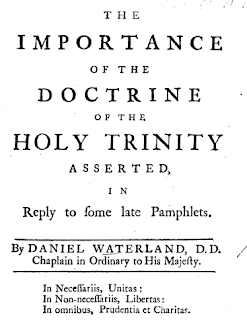"Interwoven with the very Frame and Texture of the Christian Religion": Waterland on the practical significance of the doctrine of the Trinity
And therefore, if Worship be a practical Matter, this Doctrine also is practical, and not a Point of mere Speculation. That Worship is a practical thing, I suppose, no Man of Sense will dispute; or if any one does, it must be a Dispute only about Words, and not affecting the main thing: Wherefore, it must be altogether wrong to imagine, that the Doctrine of the Trinity is purely notional, or has no Connexion with Practice. If the Doctrine be true, it is Sacrilege, and great Impiety in every Christian to refuse to worship Father, Son or Holy Ghost ...
While we consider the Doctrine of the Trinity, as interwoven with the very Frame and Texture of the Christian Religion, it appears to me natural to conceive; that the whole Scheme and Oeconomy of Man's Redemption was laid with a principal View to it, in order to bring Mankind gradually into an Acquaintance with the three divine Persons, one God blessed for ever. I would speak with all due Modesty, Caution and Reverence, as becomes us always in what concerns the unsearchable Counsels of Heaven: But I say, there appears to me none so natural, or so probable an Account of the divine Dispensations, from first to last, as what I have just mention'd ; namely, that such a Redemption was provided, such an Expiation for Sins required, such a Method of Sanctification appointed, and then revealed, that so Men might know that there are three divine Persons, might be apprized how infinitely the World is obligated to them, and might accordingly be both instructed and incited to love, honour and adore them here, because that must be a considerable part of their Employment and Happiness hereafter.
I urge not this as an Argument of the Truth of the Doctrine, but as a consideration of great Weight, suppoſing the Doctrine true, for the recommending it to our Affections, and for the raising our Ideas of it. The divine Dispenſations appear both rational and amiable, conſidered in this Light: And if it be not too bold to offer any rationale of them I would humbly preſume to say, that there is none so satisfactory, as what I have now mentioned ...
Let the Matter of the Belief be otherwise ever so speculative, (tho’ it is not the Case here ) yet to believe Scripture Verities, prime Verities especially, is under Precept, is expreſs Duty; and all Duty is practical in a large sense, as it is paying Obedience to God's Command. St. Paul therefore, more than once, speaks of the Obedience of Faith, and with great Propriety, since Believing is obeying the Will of God, and is entitled to a Reward. It is true, Faith and Obedience (taking Obedience in a more restrained Sense) are often contradiſtinguish’d: But, interpreting Obedience in its fullest and most comprehensive Meaning; Faith is properly a Species of it, another kind of Obedience.
... it has been shown, that the Doctrine of the Trinity is of prime Consideration for directing and determining our Worship, and that it influences Chriſtian Practice many ways, as forming proper Dispositions, as raising and strengthening the Gospel Motives, and as enforcing the Doctrines of Satisfaction made by Christ, and of Illumination and Sanctification by the Holy Spirit; on all which Accounts it appears to be strictly practical, and highly important: And it has been further intimated, that all Duty is practical, and that Faith is Duty; and therefore this Faith, as well as any other, and because of its important Nature, more than many other. I conclude therefore from the Premises laid down in this Chapter, that the Doctrine of the Trinity is practical enough to be a Fundamental Article of Christianity.




Comments
Post a Comment